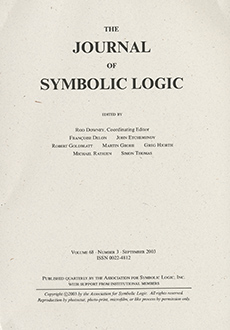Abstract
Continuous first-order logic has found interest among model theorists who wish to extend the classical analysis of “algebraic” structures (such as fields, group, and graphs) to various natural classes of complete metric structures (such as probability algebras, Hilbert spaces, and Banach spaces). With research in continuous first-order logic preoccupied with studying the model theory of this framework, we find a natural question calls for attention. Is there an interesting set of axioms yielding a completeness result?
The primary purpose of this article is to show that a certain, interesting set of axioms does indeed yield a completeness result for continuous first-order logic. In particular, we show that in continuous first-order logic a set of formulae is (completely) satisfiable if (and only if) it is consistent. From this result it follows that continuous first-order logic also satisfies an approximated form of strong completeness, whereby Σ⊨φ (if and) only if Σ⊢φ∸ 2-n for all n < ω. This approximated form of strong completeness asserts that if Σ⊨φ, then proofs from Σ, being finite, can provide arbitrarily better approximations of the truth of φ.
Additionally, we consider a different kind of question traditionally arising in model theory—that of decidability. When is the set of all consequences of a theory (in a countable, recursive language) recursive? Say that a complete theory T is decidable if for every sentence φ, the value φT is a recursive real, and moreover, uniformly computable from φ. If T is incomplete, we say it is decidable if for every sentence φ the real number φT∘ is uniformly recursive from φ, where φT∘is the maximal value of φ consistent with T. As in classical first-order logic, it follows from the completeness theorem of continuous first-order logic that if a complete theory admits a recursive (or even recursively enumerable) axiomatization then it is decidable.
Citation
Arthur Paul Pedersen. Itaï Ben Yaacov. "A proof of completeness for continuous first-order logic." J. Symbolic Logic 75 (1) 168 - 190, March 2010. https://doi.org/10.2178/jsl/1264433914
Information





